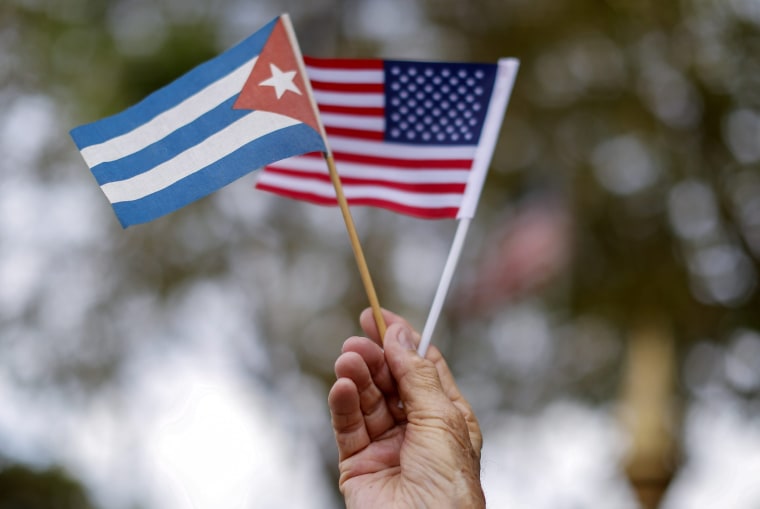Fair is fair. In a surprise move, President Obama ended preferential immigration treatment for Cubans. Now the longstanding “wet foot, dry foot” policy for Cuban migrants is over, and this change is welcome and necessary.
In a statement last Thursday, the president said, “Effective immediately, Cuban nationals who attempt to enter the United States illegally and do not qualify for humanitarian relief will be subject to removal, consistent with U.S. law and enforcement priorities.”
There is no longer a sound reason for granting Cubans special immigration status. The old policy was unfair to other immigrants, and its end is a logical extension of our new relationship with Cuba.
Cuban immigrants have long received special protection under the Cuban Adjustment Act of 1964. Under the “wet foot, dry foot” policy, which was instituted by President Bill Clinton in 1995, Cubans who were apprehended by at sea were turned back (“wet foot”), while those who made it to U.S. soil (“dry foot”) were allowed to stay and fast-tracked for permanent residency after a year.
So until yesterday, Cubans basically just had to get here in order to start the process of becoming a U.S. citizen. If this sounds like a rather generous immigration policy, that’s because it was. What’s more, Cubans could also immediately qualify for government programs that other undocumented adult immigrants cannot access – such as food stamps, disability payments, and welfare benefits.
The original idea behind the special status for Cubans stemmed from the fact that many were political refugees fleeing persecution, and the U.S. had a vested interest in undermining Fidel Castro.
However, things have changed between the U.S. and Cuba, with President Obama announcing the normalization of relations in 2014. And, as an editorial in the Miami Herald noted, Cubans increasingly come here for economic freedom. This means that they no longer necessarily warrant the U.S. government rolling out the red carpet for them.
Of course, in Cuba the Castro regime is still in power, with thousands of dissidents imprisoned and its people denied freedom of speech and freedom of the press. The Cuban people are certainly not free.
But the same case could be made in countries like China, Congo, Venezuela, even the Philippines under Rodrigo Duterte. Haitians who come to the U.S. without visas are routinely deported. In the past few years, migrants from Central America have arrived at our southern border fleeing for their lives, because of gang violence in their home countries. Why should Cubans be the only group granted special humanitarian relief?
Obama is not slamming the door on Cuban immigrants. Under the new policy, Cubans will still be able to come to the U.S. They can make their case for asylum status just like anyone else. Or they can apply for entry through the visa lottery, like legal immigrants from other countries do; some 20,000 spots will still be set aside for Cubans, according to the Associated Press.
RELATED: End to Cuba Migration Policy Draws Anger, Agreement, Surprise
The special treatment accorded Cubans had to end because, lately, it has encouraged migration without visas. Since the U.S. and Cuba moved towards better relations, many Cubans expected their unique immigration status to change. As a result, there has been an influx of Cuban arrivals, with many taking an overland route through South America and Mexico.
In 2013, the year before Obama announced new relations with Cuba, there were about 24,000 Cuban arrivals in the U.S. This figure nearly doubled in 2015, and reached 54,000 in 2016. The inequitable immigration policy was most visible along our Mexican border, where Cubans have been breezing across the border and getting approved to stay in the U.S within hours – in contrast to other undocumented as well as legal immigrants who wait years for a shot at residency.
The special status granted to Cubans has also led to rampant abuse of the many government benefits available to them. The Sun-Sentinel has reported that some Cuban migrants continue to collect welfare – even after they voluntarily returned to Cuba.
The mayor of Miami, Tomas Regalado, called this new policy shift “a gift” to the Castro regime, and Sen. Bob Menendez (D-NJ) denounced it, calling it “ill-conceived.”
Still, the policy change could be seen as putting more pressure on the Castro regime. Without an outflow of its most discontented citizens, Cuba may be gradually forced to make changes from within.
There will be those who decry the president taking action so suddenly, and through executive action. Yet if this policy had been announced beforehand, it would have likely set off a surge of Cuban immigration. If Obama had left this action to Congress, the result would probably have been inaction – since the Cuban-American lobby and the immigration hardliners would have been at odds with one another.
The end of the “wet foot, dry foot” policy may well give Cuban-Americans, a traditionally Republican bloc of voters, a greater stake in the debate over immigration reform.
The termination of “wet foot, dry foot” is long overdue. Its end will move the U.S. towards a fairer, more consistent immigration policy for all – one without a double standard for the privileged few.
Raul Reyes is an NBC Latino contributor, attorney, journalist and TV commentator.

